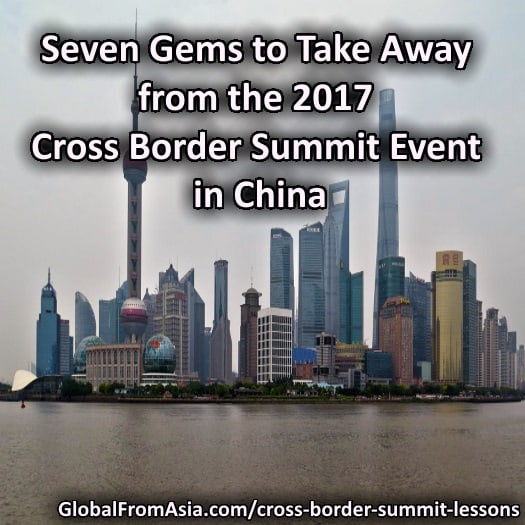
During the 2016 Cross Border Summit 2017, as a first time visitor, I was a newcomer to cross border business. I had only been in business for approximately six months and so everyone I listened to at the event was very helpful and provided great tips for implementing into my own evolving business.
Now in 2017, I’ve had over a year of experience and a year to apply the advice of what I learned from the 2016 Summit. So it was an honor to attend the event this time as more of an equal, and someone who got to talk with his peers. I even had a guest speaking spot on a manufacturing panel, where I got to share my observations on sourcing the business. To my surprise, I found that a lot of my instincts were right in line with what many others in the business were doing.
This year was another great year and I got to learn a great deal from some big thinkers in the industry—specifically in structuring the business, as this was the theme for 2017. While it’s not easy to boil down the whole summit to seven main points, I’ll give it a try.

Lesson 1: Keep your competitors close!
Sure, it’s easy to think of your competitors as evil charlatans who are stealing your clients away. But one of the best points I got from my panel discussion was how speaking to your competitors in person can be of such great help. I’m not talking about analyzing their practices, as we all do, but actually sitting down with them and discussing their philosophies and their experiences they’ve had in the same business as you—but from a different angle. I was lucky to have a panel discussion with Sam Boyd, Mike Bellamy, Andy Church and Manuel Becvar, and one of the main points was, in fact, the brotherhood and the camaraderie of working with Chinese business leaders, who will want to go out for drinks and share experiences. The personal approach never hurts and in most cases it will fire up your imagination. That’s what I took away from my experience.
Lesson 2: Networking is important because it keeps you up to date with your changing industry.
Alex Noah’s presentation got us all thinking how technology is going to drive the customer experience and it’s not just about expanding your mind with new perspectives, but it’s also about keeping up to date with the industry. He even said that since technology is driving every industry today, that if you’re not planning to incorporate new technology into your business – in the next 10 or 20 years your business will die. In addition to that, you have potential clients and potential partners at these networking events, so they’re always worth going to see, since they’re so important to our survival as business owners.
Lesson 3: Global market research is important because China is really no authority to guide you on that.
Alex’s presentation had a lot of great tidbits about the structures of the manufacturing industry, including issues with price and ever-changing services.
What’s interesting about China’s market is that there really is no standard market rate that one can easily quote. It depends on the product, on shipment spaces, and on multiple logistics, from air to sea freight.

Lesson 4: You have to work harder to be more transparent.
Along with frequent problems in customs with red tape and minor details being missed, there are more issues with being transparent to customers…and from what I’ve noticed in my experience, is that transparency, which is the global standard, is not necessarily what you get in working with Chinese factories. They’re the opposite of transparent sometimes, and this is part of the reason why I felt the need to make my company more transparent and fitting to our targeted audience, and the values of our brand.
Lesson 5: You have to adapt to the customer-centric market that tech companies are opening up.
One focal point of coverage of the market was Amazon’s plans for world domination! That is, Amazon an innovative tech company, not just a product catalog. What really stuck out in the entrepreneur’s mind about Amazon is how (1) they’re customer-centric. They’re in the future of automating and customizing most shopping experiences for the customer. This “augmented reality” is all about enhancing the customer experience to be more personal. And (2) their main focus in the market right now is in lowering the buying price for consumers, for these new-age products and indeed helping the once distant future into becoming the here and now.
Are computers leading the way in the personal sector, when compared to us? How embarrassing if we’re not following in their footsteps by thinking about the future and customizing our stores and products to meet the demands of audiences now and later on. The personal touch we offer customers is not in eschewing technology, just like technology is no longer cold and impersonal. It’s a combination of bringing both worlds to our audience. So don’t focus solely on old school marketing tactics. Be ultra-modern!
Lesson 6: Future hiring trends are global, as there’s limited advantage to sticking to local.
Gerard Nieuwenhuis, CEO of TRNDLabs spoke of the importance of managing a distributed team and the proven advantages in hiring employees not just locally, but from all over the world. The thought was shared that hiring employees at the same rate and with comparable benefits helps in the spirit of transparency. He talked about having employees in South America, Europe, and so on, and how this pattern leads to a more global mentality, which is ideally what we want—if we dream that big.
Lesson 7: You do business with the world, you become a world citizen.
Best of all, because of the in-depth nature of the speakers and panels, I was able to ask myself a lot of deep questions that I never really thought about before. Not the usual question of where my company is heading but also where I was heading as an individual. Did I want to travel freely or just go back an settle in Canada when I’m done in China?
Andrew Henderson, from the Nomad Capitalist, had a part on building a lifestyle, not just a short-term fantasy. He illustrated the great freedom that comes from being a multinational citizen, an entrepreneur that can go most anywhere in the world.
Do you limit yourself to where you’re “stuck” doing business or do you go where you are treated the best? There are decided advantages to having multiple passports, and properties all over the world—not only for tax savings but also for having that freedom to leave if you don’t like the environment you’re currently in. Offshore banking was also reviewed, and the financial incentives that a big thinker has there.
Last but not least, I got to talk to Mike Bellamy and from a completely different platform this year than last year at the 2016 Cross Border Summit. My business has made great strides in the last 12 months ever since the first Summit I attended—and not so coincidentally took a lot of notes during that event, which really helped me.
I was once a newcomer and now I had earned Mike’s attention as an established entrepreneur in my own right, with my own name and reputation. It was also a thrill to realize that 90 percent of the stuff he was advising all these newcomers to do, was what I already did in my business. My company was doing things right. My people and I were at the cutting edge of the industry and seeing so far into the horizon that the enthusiasm was contagious.
I look forward to next year when no doubt more exciting news will be delivered, and I will return to the event (hopefully in an even bigger role!) so that I can meet or greet with my peers and we can brainstorm and help shape the world of tomorrow – one product at a time.
This article is written by Rico Ngoma, the CEO of Source Find Asia that specializes in helping businesses achieve high performance in Asian markets through sourcing and procurement consulting. Be sure to check out their website for more great resources and services for all your sourcing needs. Rico is also a VIP member of Global From Asia’s network of experts. Check his profile here.
